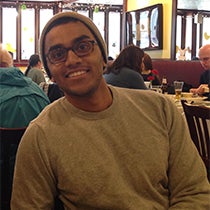Harvard College Undergraduate Student Profile: Arjun Byju
Malaria is an ancient disease that evolved in insects at least 100 million years ago. In fact, the prehistoric origin of malaria parasite suggests that the first vertebrate hosts likely included reptiles, such as dinosaurs. Today, 3.2 billion people – almost half of the world’s population – live in areas at risk of malaria transmission. As we learned from Arjun Byju, a Harvard College ’17 History Concentrator who is also pursuing coursework in pre-med, to fully understand this major public health threat, we must examine malaria’s historical roots and its evolving relationship to humans, and then apply this knowledge to drive progress toward elimination forward.
In early Spring, when Arjun learned that he was accepted into the Harvard’s Defeating Malaria: From the Genes to the Globe Undergraduate Colloquium, he didn’t expect that in a few short weeks, his concept of malaria – and global health – would shift entirely. In reflecting back upon his early expectations for the Undergraduate Colloquium, he says, “I was hoping to get information about malaria and to learn more about the disease, but I got a lot more out of the experience than just information. Not only did I learn about the basic biology of malaria, I also learned about the history of the disease, its impact on society, and the complex interactions between the parasite, vector (mosquitos), and humans.”
The Undergraduate Colloquium, launched by Harvard faculty in 2012 under the auspices of Harvard’s Defeating Malaria: From the Genes to the Globe initiative, offers a unique experience for Harvard College students. Each year, a capped cohort of approximately 26 students—ranging from rising Freshman to Seniors with diverse backgrounds and academic and extracurricular interests—meet over dinner at the prestigious Harvard Faculty Club in Cambridge to learn about the problem of malaria from expert Harvard faculty. This year, a delegation from Zimbabwe, including Brigadier-General Gerald Gwinji, Health and Child Care permanent secretary, joined the Undergraduate Colloquium to share their experiences with malaria and perspectives on eliminating the disease in Africa.
What drives a Harvard College student to take on a non-credit, extracurricular activity about malaria? In the case of Arjun Byju, exploring different subjects has been a mainstay of his undergraduate experience. Soon after arriving at Harvard College from his home in Florida, Arjun immediately began pursuing a range of interests beyond his primary concentration. He took several classes in the sciences, including Foundations of Biological Diversity (OEB10) and Life Sciences 1b. An Integrated Introduction to the Life Sciences: Genetics, Genomics, and Evolution, while also exploring different subjects such as economics and history. After taking a course on the European Scramble for Africa: Origins and Debates (Hist 60L) during his sophomore year, Arjun recalls that his interests in medicine and global public health were particularly piqued. “I began learning about the history neglected tropical diseases and current inadequacies in health care system; and I realized that human history and medicine are intertwined.”
To gain a better understanding of the interconnections between health and history, he began researching the field of global health and discovered that it involved a variety of disciplines outside of medicine, including history, economics, politics, and psychology, to name a few. As a result of his study, Arjun now says, “Global health is truly an interdisciplinary field of study – all medicine involves history; we need to know all the facts before we can solve the problem.”
The historic fight against malaria has resulted in both successes and failures. As Professor Marcia Castro, Associate Professor of Demography at the Harvard T.H Chan School of Public Health, explained during the Undergraduate Colloquium, many countries boldly claimed the disease was successfully eradicated in the 1950’s and 1960’s. Years later, many of these same countries would face malaria resurgence due to insecticide resistance, drug resistance, human migration, weakling of malaria control measures, and related challenges that made long-term eradication unattainable and contributed to more lives lost.
In explaining the basic reproduction number of malaria (how an infectious disease spreads through a population), Professor Dyann Wirth, a renowned malariologist and Faculty Director of the Harvard Integrated Life Sciences Program (HILS) at the Graduate School of Arts & Sciences, followed up on Professor Castro’s point by showing students a colorful slide of international stamps declaring elimination of the disease. Arjun recalls, “It was shocking to see all of these country stamps declaring that ‘We defeated malaria,’ and later learning the disease ended up coming back worse than before. I learned that fully addressing the disease requires a multidisciplinary approach to malaria, and understanding the roles different sectors and disciplines play in addressing major global health challenges. How we understand history will ultimately help elucidate how we tackle malaria.”
Based on the new insights gained from experimenting with coursework and curricular activities outside his primary concentration, Arjun says he would encourage other students to put in the extra effort to take in courses outside of their primary concentrations, too. According to Arjun, Harvard’s Defeating Malaria: From the Genes to the Globe Undergraduate Colloquium provided an exceptional opportunity to ask questions and engage in discussion with faculty and peers. He’s even considering pursuing a dual MD/MPH degree – “it would be great to learn more about combining the clinical and social aspects of health.”

Arjun Byju ('17 History Concentrator)
At the 2016 Undergraduate Colloquium, Arjun learned about the basic biology of malaria, as well as the interconnections between health and history. According to Arjun, “Global health is truly an interdisciplinary field of study – all medicine involves history; we need to know all the facts before we can solve the problem.”